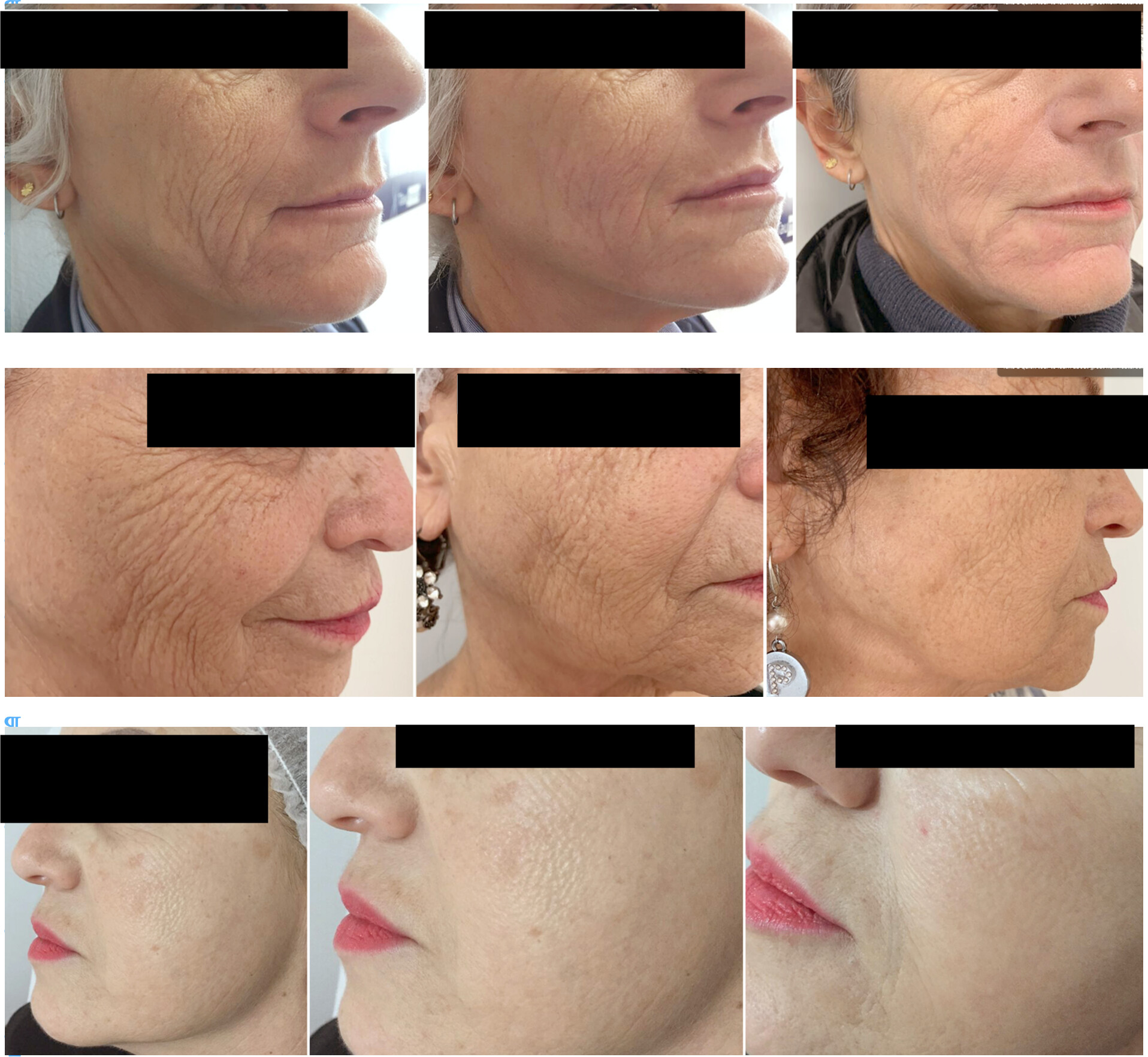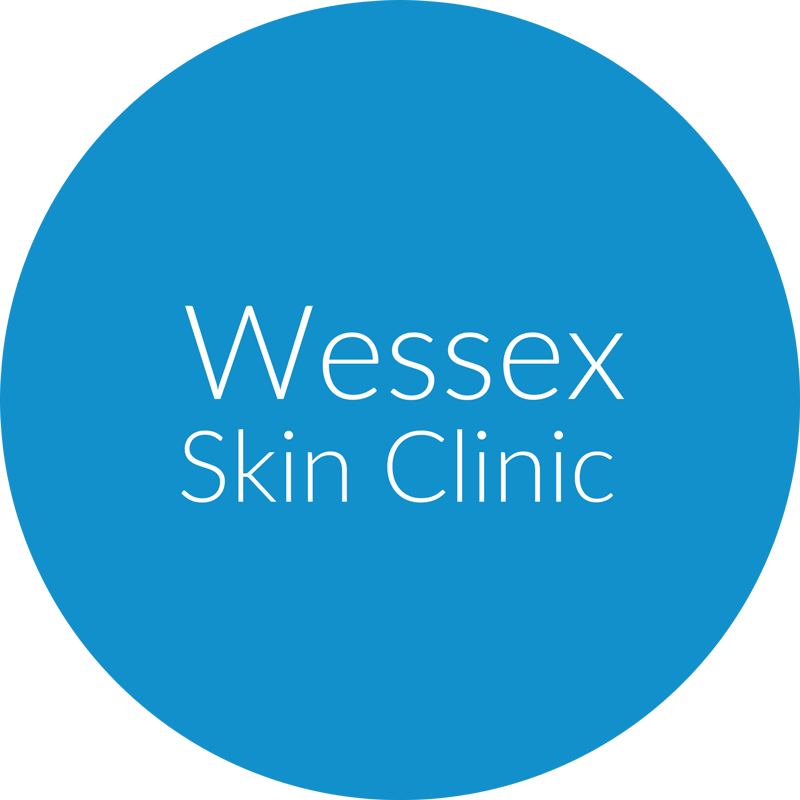What are polynucleotides?
Polynucleotides are injectable products that are derived from filtered and ultra purified DNA fractions extracted from the sperm of salmon. they are a by-product of fishing practices. Polynucleotides are able to stimulate fibroblasts, which in turn promotes tissue repair, collagen production, and improves skin quality.
They are well known for their wound healing and bio-stimulating properties. Through fibroblast stimulation, polynucleotides promoting tissue repair, enhancing cell turnover, increasing elasticity, and stimulating collagen production.

Before and After
Photographs at baseline, at the third and last treatment/ assessment session after six weeks, and at follow-up, 6–8 weeks after the last treatment session. Plinest® fast and Plinest® Eye.
What does it treat?
Polynucleotides possess the ability to reduce inflammation and restore the balance of melanocytes in the skin ( the cells responsible for controlling pigmentation), resulting in a more even and refreshed skin tone without adding volume, like traditional dermal fillers.
Theu can be used to treat conditions such as Rosacea, eczema, hyperpigmentation, alopecia and premature skin ageing secondary to excess sun exposure.
During your consultation, we will discuss your concerns and assess your medical suitability for specific treatments. If polynucleotides are deemed suitable, then a detailed explanation of the trearment process will be given as well as patient information leaflets.
The benefits
- Polynucleotides are a versatile treatment that can be used to treat a vast range of skin conditions
- They have a wide range of clinical indications including scarring, acne scarring, stretch marks, deep lines and wrinkles, skin hydration and rejuvenation as well as androgenic hair loss and alopecia.
- They can be used safely in every part of the body
- Treatment typically involves intradermal microdroplet injection technique although at times a cannula can be used for a linear retrograde deposit of the product. Two to three treatments 14 to 21 days apart is a typical cycle.
- Polynucleotides can be combined with other treatments such as laser and or microneedling in a treatment package to achieve a patient’s end goal.
More information about Polynucleotides
Where it works best
- Around the eyes (periorbital region) where the skin is delicate and crepey.
- the neck, decolletage and any areas demonstrating premature lines
- The scalp in those with hair loss
- Any scars such as acne scars and surgical scars.
Works well with
- Other skin boosters
- Microneedling
- Non ablative laser
Which types of Polynucleotides work best?
- There are a few different polynucleotides on the market but we use the Plinest range
Are polynucleotides safe?
- Yes. In short
- They have been available clinically for many years. Used in hospital medicine for various clinical indications inclduing eczema
- There is extensive information from clinical trials on their efficacy and safety
Does treatment hurt?
- Polynucleotides are administered by injection and treatment involves several tiny pin-pricks that sting or tingle during injection
How should I prepare for Polynucleotide treatment?
- No specific preparation is needed.
How will I look immediately after treatment?
- The injections cause small bumps in the skin that settle within an hour or so.
- Very occasionally, a small bruise may develop at an injection site.
Is there any important aftercare?
- Avoid exposure to sunlight or sunlamps for 48 hours after treatment
- You can return to work and normal daily activities immediately after treatment but avoid exercise, alcohol, or massaging the treated area for 3 hours after treatment.
- You are likely to look red but the redness settles and injection points disappear quite quickly
How soon after the treatment will I notice an improvement?
- Polynucleotide treatment requires a course of two to three treatments 14 days apart.
- It may take up to 6 weeks post first treatment to start to notice improvement in the areas that have been treated.
How long does last?
- Target treatment results can take up to 12 weeks
- It may be worth repeating treatment once every 6 months to maintain results.
Does treatment produce any side-effects?
All side-effects are temporary.
- A small bruise at one or more of the injection sites
- Persistent stinging and discomfort following treatment lasting for several hours but settling within a day
- Redness and minor swelling at injection sites
Who should not have polynucleotide injections?
- Women who are pregnant or breast feeding
- If you have a severe allergy to fish
- If you are needle phobic
Dr Catherine Fairris is warm and welcoming with expertise and compassion, and will talk you through your needs with professionalism and honesty.
If you are looking for somewhere where you will be treated like a friend with a personal, caring service and be introduced to products and services tailored to you, then look no further.
I would thoroughly recommend.
Why Choose Wessex Skin?
Thorough consultations
Prior to treatment you will have a thorough consultation to devise a treatment plan.
Natural-looking results
Your treatment will be carried out by Dr Catherine Fairris who has extensive experience using anti-wrinkle injections
Combination treatment
You may require a combination of ainti wrinkle injections and dermal filler to achieve your desired outcome.
Experienced Doctor
All treatments are delivered by a highly qualified and experienced aesthetic doctor
Discretion assured
We have a discrete reception area with private entrance.
Convenient access
On-site parking and close to J10 of the M3.
Are you interested?
Why not contact us to book your complimentary appointment with Dr Catherine Fairris for a personalized treatment plan?
